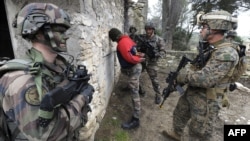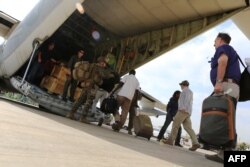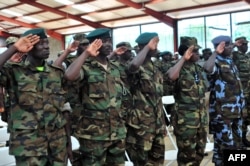In 2012, the U.S. State Department special office in Benghazi, Libya, was attacked by Islamic militants, killing U.S. Ambassador J. Christopher Stevens and U.S. Foreign Service Officer Sean Smith. Stevens became the first U.S. ambassador killed in the line of duty since 1979.
Controversy and questions regarding security and preparedness followed.
Consequently, a quick response military unit with Marines and Navy personnel was formed in 2013. Called the Special Purpose Marine Air-Ground Task Force (SPMAGTF), the unit is permanently based in Spain.
"The primary role of this force of just under 2,000 Marines and sailors is for U.S. embassy reinforcement," said former unit commander Colonel Calvert Worth, Jr., who was in New York on Wednesday to brief the foreign press on the role of the SPMAGTF.
"The force is to respond to the ambassador or chief of missions … within a short time frame” that allows “the ambassador or chief to evacuate his forces or get out of harm's way in the face of a crisis on the African continent," he said.
"We have our own helicopters and airplanes [Osprey choppers and Hercules transports] that will allow us to put a sizeable force on the ground at the request of an ambassador to protect U.S. personnel and facilities."
The SPMAGTF base in Moron, Spain, is within easy reach of the African continent.
The unit also supports noncombatant evacuation operations, offers training to support partner interests, offers humanitarian aid and trains security forces in countries such as Mali, Senegal, Guinea, Ghana, Mali and Gabon, Worth said.
How embassies work
Worth said a big part of setting up and running the unit was learning about embassies.
"We have to do a lot of work with the State Department so that we understand how the embassies work,” he said, “where they receive their direction from, what their capacities are, and how we can be most relevant in supporting the ambassador when he calls for this force to come forward into a country.”
But that wasn't all.
"We spend considerable time studying the cultures of the specific country or countries that we are most likely to operate," Worth added.
African forces
The unit will also work with African military forces.
"We have proximity to crisis because of our relationship to these African countries,” he said. “When we go to these countries, we intend to train with the host nation that provides us this proximity and this access to crisis countries. We train with them, military to military."
Worth said that during his time in Africa, the unit conducted exercises with two countries, Senegal and Mali.
A force of just under 200 was moved to Senegal, he said, where “we did military-to-military training and worked with the embassy. And that was all for the purpose of maintaining access, maintaining reach.”
In Mali, Worth said, the unit went into the embassy, “rehearsing an embassy in crisis and how we would respond. … we worked with the host nation, their security forces and got a very, very good rehearsal that was mutually beneficial for Malian forces and U.S. personnel and the embassy team."
The idea was to sensitize both the civilian and military personnel as to the capabilities of the special purpose task force and its willingness to work with the host nations in times of crisis.






